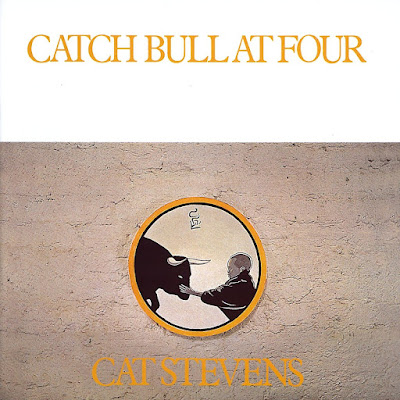November 18, 1997: The revival production of Chicago opened in London's West End.
The original cast of the production included German jazz singer Ute Lemper as Velma, British actress Ruthie Henshall as Roxie Hart, Nigel Planer as Amos Hart, and Henry Goodman as Billy Flynn.
(sign up to follow by email)
The production won the 1998 Olivier Award for Outstanding Musical, and Lemper was awarded Best Actress in a Musical. Both Lemper and Henshall have played the role of Velma on Broadway.
Read more: Wikipedia
November 18, 1972: Cat Stevens' album Catch Bull at Four goes to Number 1 in the US.
Catch Bull at Four began with a statement of purpose, "Sitting," in which Cat Stevens tried to talk himself into believing that he hadn't stalled, beginning to worry that he might be falling behind schedule or even going in circles.
It may be that Stevens' recent experiences had contributed to his sense that he was running out of time. Though he was never a directly confessional writer, one got the sense that his disaffection with the life of a pop star was reasserting itself. And while he was touring unhappily around the world, the world was still going to hell in a handbasket.
Read more: Allmusic
November 18, 1978: Ambrosia made it to the Top 3 on the Billboard Hot 100 single's chart with "How Much I Feel."
"How Much I Feel" is about still being hung up on a woman long after they broke up. Near the end of the song, the singer mentions that he's married and "we're still going strong," but "sometimes when we make love, I can still see your face." This marriage doesn't sound like a healthy one.
Read more: Songfacts
November 18, 1989: Skid Row has the highest song entering the US music chart, at Number 63, with "I Remember You."
If Rachel Bolan and Dave Sabo had their way, Skid Row wouldn't have even recorded the song that made them too popular to take out their own trash.
 |
| Sebastian Bach |
Luckily, singer Sebastian Bach had other ideas. In his 2016 book 18 and Life on Ski Row, Bach -- who's now estranged from the band -- explained how he campaigned for the song, begging the group to play it at rehearsal for their manager at the time, Doc McGhee.
Read more: Ultimate Classic Rock
November 18, 2003: The Beatles released "Let It Be... Naked" minus the Phil Spector embellishments on the original album.
In its original form, Let It Be signaled the end of an era. The 1970 release evolved from friction-filled sessions the band intended to be an organic, bare-bones return to their roots. Instead, the endless hours of tapes were eventually handed over to Phil Spector. Let It Be... Naked sets the record straight. Removing the orchestrations from "The Long and Winding Road" gives Paul McCartney's vocals considerably more resonance on the former.
Read more: Allmusic
All That Jazz
Ute Lemper
Ute Lemper



No comments:
Post a Comment